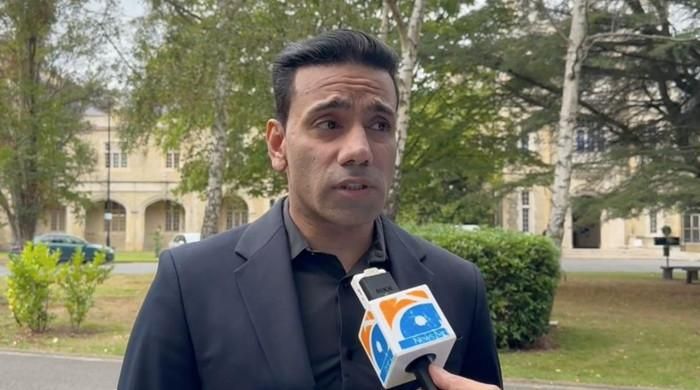- The four laptops confiscated from Javaid are at the heart of the case against the police.
- The laptops contain evidence supporting his rightful ownership of the money.
- He claims the confiscated devices were “tampered with” by London police.
LONDON: Former British-Pakistani money exchange boss Ahsan Javaid has sued Scotland Yard to recover nearly £600,000 seized by police after the Crown Prosecution Service (CPS) failed to prove its £34 million money laundering case against him, leading to the high-profile trial ending and his acquittal.
At the centre of Javaid's case against London police are his four laptops, which Scotland Yard officers seized during raids in November 2017 and returned after nearly four years.
Javaid alleges his laptops were tampered with, altered, his passwords changed and key evidence to support his rightful ownership of the confiscated money was destroyed, following his acquittal in the criminal case.
Javaid, his wife Amna Gulzar and two others were first arrested in November 2017 but charged in May 2018 with conspiring to launder £34m between 2012 and 2018, mainly to Pakistan, under false identities by setting up fake companies and accounts.
They were accused of hiding cash in 43 bank accounts before transferring it from the UK to Pakistan and other countries, but the trial ended amid failures by police and prosecutors.
However, police failed to return the money seized from Javaid, estimated at £600,000, at the time of his acquittal in October 2021. Now, the British-Pakistani has taken police to court for discrimination, injustice and wrongdoing.
The trial concluded in October 2021 at Snaresbrook Crown Court due to “systemic and catastrophic” disclosure failures by the prosecution, lack of preparation and lack of evidence.
Judge Charles Falk halted the trial and sentenced the prosecution after the prosecution requested more time to investigate and prepare evidence, nearly two months after the trial was scheduled to begin.
“There has been a catastrophic failure because the investigation grew exponentially in size without being allocated sufficient human resources, training or experience,” the judge had said.
Javaid and his family celebrated the end of the trial and the prosecution’s failure to secure a criminal conviction against him, but his dilemma did not end there as he was told by police that his money will remain frozen and seized by police as recoverable money under the Proceeds of Crime Act (POCA), which gives police the power to seize money without formal charges, based on suspicions that the amount seized is recoverable property or is intended to be used in unlawful conduct.
Javaid said Geo news In an interview, he and his family lived through a terrible nightmare for several years. He said he has no doubt that he was treated like this because of his Pakistani background and that anyone else in the same situation would be treated differently by the UK police and prosecution service.
He shared: “The money we sent to Pakistan was remittance transfers. There was no money laundering or criminality of any kind. We sent money from poor and working class people in the UK to Pakistan. Our companies were registered with the Financial Conduct Authority (FCA).”
“The police accused us in May 2018 of money laundering. We said from day one that we were not involved in any kind of money laundering, but nobody believed us. However, after almost four years it was proven that we were right and that we were innocent, as the prosecution could not prove anything against us,” he added.
“The prosecution said they had all the evidence ready and tried to pressure us into pleading guilty, but we refused because we were not guilty. The trial started at the request of the prosecution and then the prosecution told the court that they were not ready,” Javaid added.
“It was established in court that the money was sent to Pakistan through banking channels and everything was documented and declared,” he revealed.
Javaid said the prosecution failed in court because it could not prove anything against him and others as there was no evidence and the CPS was trying to find and fabricate evidence when there was none.
“Almost two months into the trial, it was clear that the prosecution was clueless and was looking for solutions; it wanted to extend the case to somehow secure more time and obtain some evidence, but the judge could see that the prosecution had no case and decided that no more time could be given and therefore ended the trial,” Javaid said.
He also said police returned the laptops to him nearly four years after the trial ended, but “the passwords were changed or all the machines were tampered with” because the laptop now does not work.
He stressed: “The police withheld evidence that could support my case, interfered with my ability to provide relevant evidence and prevented me from accessing my laptops, which contained evidence of the legitimacy of the companies’ business activities.
“We believe the police changed the passwords and tampered with the diversion. We are unable to extract the evidence from those laptops. We are now asking the court to order a forensic inspection of our laptops to determine what the police did with the machines.”
“I am fighting for justice and asking the court to hold the police accountable in the case of tampering with laptops and evidence,” Javaid added.
Javaid complained that he had been victimized by the police. “My family and I suffered a lot throughout the process. When the case started, I had a Pakistani passport and was put at risk of flight. I remained in police custody for more than 27 months without committing any crime.
“The police tried to make things as complicated as possible, but in the end the truth prevailed and we won. I am sure we will win the civil case as well. My case goes against the police powers under the Access to Public Information Act.”
Javaid said, “Under this law, the burden of proof is on the accused to prove everything. It is also important that the police return the confiscated items in their original and authentic form. These laptops contain crucial evidence. We request the court that these laptops contain all kinds of data and that these are our genuine money, which we need and should be returned to us.”
A CPS spokesperson said Geo news“Reasonable lines of enquiry were not pursued to ensure a fair trial. We asked to adjourn the case and remedy this, but the judge ruled that the scale of that task was too great. We respect that decision.
“The Office remains committed to working with investigators from an early stage, developing proportionate and timely cases while ensuring a fair trial for all defendants.”
The Metropolitan Police said: “Following the conclusion of criminal proceedings, the Metropolitan Police made nine applications for the confiscation of cash and sums subject to account freezing orders under the Proceeds of Crime Act 2002.
“In January 2023, at Stratford Magistrates' Court, a district judge ordered the full forfeiture of the withheld cash and frozen funds. We are aware that these forfeiture orders are now subject to appeal and as such we are unable to comment further at this time.”
Police denied tampering with the laptops, saying that “a problem arose with the return of the confiscated laptops during the criminal investigation. We reject any allegations that the passwords on these laptops were changed or that they were illegally tampered with in any way.”
It is well established that an acquittal in a criminal case is not a bar to the cash forfeiture procedure. A different standard of proof applies, i.e. one that relates to money and does not require proof of guilt of any particular individual.
The outcome of the criminal proceedings had no bearing on the confiscation applications and the acquittal itself did not constitute a basis for questioning the credibility or reliability of any of the police evidence.












